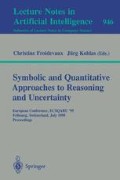Abstract
This paper offers a preliminary investigation of consequence relations which make sense in a logic of graded similarity, and their application to interpolative reasoning.
Preview
Unable to display preview. Download preview PDF.
References
Dubois D., Lang J. and Prade H. (1994) Possibilistic logic. In: Handbook of Logic in Artificial Intelligence and Logic Programing Vol. 3 (Gabbay D. et al., eds.), Oxford Univ. Press, 439–513
Dubois D. Prade H. (1992) Gradual inference rules in approximate reasoning. Information Sciences, 61, 103–122.
Dubois D. Prade H. (1995) Comparison of two fuzzy set-based logics: Similary logic and possibilistic logic. Proc. of the 4th IEEE Inter. Conf. on Fuzzy Systems (FUZZ-IEEE'95), 1219–1226. Long version in Tech. Report IRIT/94-10-R, IRIT, Univ. P. Sabatier, Toulouse, France.
Dubois D., Esteva F., Garcia P., Godo L. and Prade H. (1995). Similarity-based Consequences Relations. IIIA Research Report 95/1, Barcelona, Spain.
Esteva F, Garcia P, Godo L. (1994a) Relating and extending semantical approaches to possibilistic reasoning. Int. J. Approximate Reasoning 10, 311–344
Esteva F, Garcia P, Godo L. (1994b). On conditioning in Similarity Logic. Proc. IPMU'94 Conf., Paris, pp. 999–1005. Extended version to appear in Fuzzy Logic and Soft Computing, 1995, (B. Bouchon, R. Yager and L.A. Zadeh eds.).
L. Fariñas del Cerro, A. Herzig (1991), A modal analysis of possibility theory. Lecture Notes in Computer Sciences, Vol. 535, Springer Verlag, Berlin, 11–18
Höhle, U.(1994), Monoidal logic, In Fuzzy Systems in Computer Science (R. Kruse et al., eds.), Vieweg, FRG, 233–243
Klawonn F. Kruse R. (1993) Equality relations as a basis for fuzzy control. Fuzzy Sets & Syst., 54, 147–156
Lewis D.(1973) Counterfactuals. Basil Blackwell. London.
Makinson D. (1994) General patterns in nonmonotonic reasoning. In Handbook of Logic in Artificial Intelligence and Logic Programming. Vol. 3 (Gabbay D. et al., eds.), Oxford Univ. Press, 35–110
Trillas E., Valverde Ll. (1984) On Implication and Indistinguishability in the setting of Fuzzy Logic. In Management Decission Support Systems using Fuzzy Set and Possibility Theory (R.R.Yager and J. Kacprzyk eds).Verlag TÜV, 198–212.
Ruspini E. (1991). On the semantics of fuzzy logic. Int. J. Approximate Reasoning, 5, 45–88
Zadeh L.A. (1979) A theory of approximate reasoning. In Machine Intelligence, 9, Elsevier, New-York, 149–194
Author information
Authors and Affiliations
Editor information
Rights and permissions
Copyright information
© 1995 Springer-Verlag Berlin Heidelberg
About this paper
Cite this paper
Dubois, D., Esteva, F., Garcia, P., Godo, L., Prade, H. (1995). Similarity-based consequence relations. In: Froidevaux, C., Kohlas, J. (eds) Symbolic and Quantitative Approaches to Reasoning and Uncertainty. ECSQARU 1995. Lecture Notes in Computer Science, vol 946. Springer, Berlin, Heidelberg. https://doi.org/10.1007/3-540-60112-0_20
Download citation
DOI: https://doi.org/10.1007/3-540-60112-0_20
Published:
Publisher Name: Springer, Berlin, Heidelberg
Print ISBN: 978-3-540-60112-8
Online ISBN: 978-3-540-49438-6
eBook Packages: Springer Book Archive

